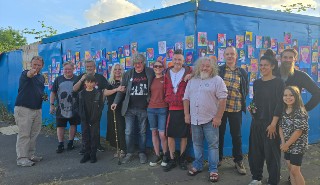University of Reading’s Engine Room Project Earns National Award for Community Leadership
A community research project supported by the University of Reading, which is investigating how Reading residents’ wellbeing is affected by sound, has been recognised by a national awards scheme.
The Engine Room, a voluntary-run arts and mental health collective based in Reading, was named the England Runner-up in the Creative Lives Awards (2024) for its innovative Sound Lab project.
The project is using a unique approach to exploring the relationship between sound and wellbeing in the Dee Park housing estate, in west Reading.
The Engine Room Sound Lab project is one of six local community-led research projects, supported by the Community Led Research Pilot (CLPR) – a programme funded by UK Research and Innovation (UKRI) and co-created by the British Science Association (BSA), the University of Reading, and local community groups.
Sound and wellbeing: A community in focus
The Engine Room Sound Lab project investigates how sound and acoustics influence the wellbeing of Dee Park residents, a community undergoing urban regeneration.
Led by community leaders Lisa-Marie Gibbs and Philip Newcombe, and supported by researchers Ceara Webster, PhD Candidate and Diversity and Inclusion Adviser at the University, and Annet Twinokwesiga, an architect and MSc Spatial Planning and Development alumna, volunteers used innovative techniques to capture the everyday noises people experience in the estate and woodland.
By engaging a diverse group of volunteers – ranging from young people to those living with disabilities or mental health challenges – the project fosters inclusivity in exploring how the soundscape and design of their living space affect their mental health.
Lisa-Marie, a local artist and one of the project’s leaders, said: “Our volunteers have been learning to experiment with new technologies, sound recording equipment, and editing processes.
“We’ve explored the tonal acoustics within a community and the effect this can have on the wellbeing of local citizens.
“Our emphasis has always been about giving people living with mental health challenges the power, skills, and loving encouragement to take a lead in their own local community.”
A key feature of the project was the creation of a large ceramic pot, sculpted by 57 community members, which was used as a sound vessel to capture and amplify the noises of the estate and create a more immersive experience.
The UK Government’s Arts Minister, Sir Chris Bryant said: “Finding the time and space to be creative can allow people of all ages and backgrounds to use their imaginations and create beautiful artwork, write thought provoking poetry and express themselves through music and dance, for example. That’s why we want to ensure everyone has the opportunity to get creative, not just the privileged few.
“I would like to offer a special congratulation to The Engine Room, the runners-up of the England Award and say thank you to all the groups shortlisted for this year’s Creative Lives Awards for the work they do improving and transforming lives in communities across the country.”
Community led research
The CLRP pilot programme is led by the University of Reading’s Dr Sally Lloyd-Evans, Public Engagement with Community Research Fellow, and Dr Alice Mpofu-Coles, Community Research Associate.
It puts local knowledge at the heart of the research process, empowering communities to shape the questions that matter most to them and set the research agenda rather than have it imposed on them from the outside.
This community-led approach ensures that research is inclusive, accessible, and grounded in the lived experiences of those who are often excluded from traditional academic practice.

